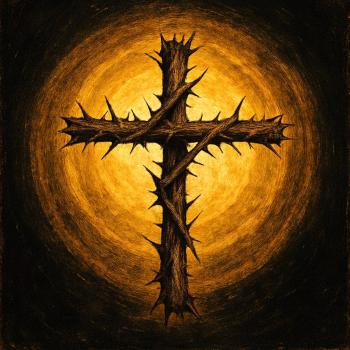One Sunday, after singing the words to "Here I Am Lord" (I, the Lord of sea and sky... My hand shall save...), I turned to my husband and said, "Why are we always pretending to be God in these contemporary Catholic hymns? It strikes me as a bit presumptuous." I then began to notice the inordinate number of references to "I," "me," and "my" in the hymns I was being asked to sing. (As I later read in Thomas Day's Why Catholics Can't Sing, the music "oozes with an indecent narcissism.") Before long, I was standing arms crossed refusing to sing at all.
One day, while I was driving with my five-year-old son, a piece by Bach came over the car radio. "Mommy," my son said, "This is Mr. Bach. We listen to his music in church. I mean we used to listen to him in our old [Lutheran] church. Mommy, can we go back to Mr. Bach's church?" I know Bach is not the be-all and end-all of the worship experience; nevertheless, my husband and I decided we could not attend a parish that undermined our attempts to instill in our children a love of the great liturgical and musical traditions of the Church.
Next stop, St. Catherine's. Here, I experienced the mega-church, Catholic style. St. Catherine's has an excellent organist and a large choir, but they sing the exact same music as St. Mary's, only it is more annoying because the better the performance, the more schmaltzy the music sounds. The monsignor at St. Catherine's is a genuinely nice guy, and his liturgies reflect that fact. The sanctuary, which is really a big brightly lit auditorium, is perfectly designed to draw attention to him at all times. We did not last long at St. Catherine's. After visiting several other parishes, I began to despair of ever finding a satisfactory place of worship.
By now the darkness in my soul was hardening into cynicism as I contemplated the irony and just plain absurdity of my situation: who would have thought my problem with Roman Catholicism would be its seeming lack of reverence for tradition? I now wondered if the people leading and participating in Catholic worship actually believed what the Church taught. The informality and anthropocentricity of religious folk music help create an atmosphere in which the questioning of tradition and authority seems only natural. In the context of the modern Mass led by Father "I am just like you," the all-male priesthood and even the liturgy of the Eucharist itself can seem strangely out of place. Since much of Catholic worship has ceased to reflect the mystery, splendor, and otherworldliness of the Church, it is hardly surprising that Catholics begin to wonder why the Church cannot reflect more of the surrounding culture.
Most of the problems with worship, both Catholic and Protestant, stem from attempts to adapt worship to a therapeutic culture in which the individual reigns supreme. Pastors cater to the perceived needs and feelings of their parishioners. I know; I did it as a pastor when I gave warm-up monologues to put myself and the congregation at ease and when I made cute little remarks, especially during that new center of mainline Protestant worship, the children's sermon. I have a friend who happily described the way in which her priest combined her daughter's first communion with a pizza party in order to make the whole process "no big deal" and something "she could feel good about."
Most of the pastors I know are not on ego trips, but they are under great pressure to make worship relevant and meaningful for people such as my friend. That is not all bad: liturgy must connect with the lives of worshipers, as the Second Vatican Council rightly acknowledged. However, the accommodation of Christian beliefs and practices to a culture fundamentally opposed to Christianity has gone too far. As Cardinal Ratzinger says in Salt of the Earth, "An awareness needs to develop that in fact to a large extent we [Christians] no longer know Christianity at all."
By now, the over-accommodation of Catholic worship to modern culture -- the hijacking of the good intentions of Vatican II by liberal liturgists -- has been well-documented. This recognition, and the efforts of societies dedicated to liturgical renewal such as Adoremus and the Society for Catholic Liturgy offer hope that "reform of the reform" is on the way. In the meantime, I still faced the problem of finding a way to live with the present reality of worship within the Church.
The answer finally came after I resolved to speak to a visiting priest at the church where I attend daily Mass. I told him I was a Lutheran pastor who wanted to become Roman Catholic but couldn't find a place to worship. Did he know of a traditional parish without guitar music? He looked at me as if I resided on another planet. "Can I ask you something?" he asked. "Why do you want to become Catholic?" He asked the question in a tone that suggested, Why would you want to do a thing like that? I mumbled something about the problems in the ELCA and my belief that the Catholic Church is the fullest, most rightly ordered manifestation of the Church on earth. "Oh," he replied. "In that case you want to go to Holy Rosary. It's an Italian parish with a beautiful sanctuary and traditional music and liturgy."




